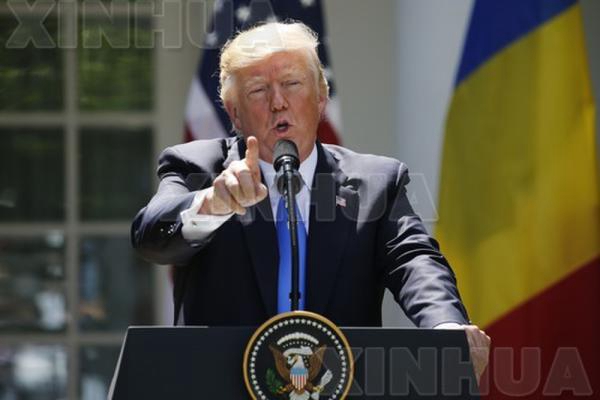Trump UN speech: An analysis
- By Sajjad Malik
 0 Comment(s)
0 Comment(s) Print
Print E-mail China.org.cn, September 22, 2017
E-mail China.org.cn, September 22, 2017
 |
|
U.S. President Donald Trump [Xinhua] |
President Donald Trump’s debut address at the annual session of the United Nations General Assembly is an odd mix of support for fiery nationalism and bellicose language.
Delivered in his trademark style, the speech echoed some of the outbursts of his presidential campaign such as the warning to trash the nuclear deal with Iran for their alleged support of terrorism in the Middle East.
"America first" also figured in as the president advised other nations to take care of their national interests.
America first seems to be more than a desire to revive the U.S. economy and create jobs for the people. It seems to be political ideology of sorts and a kind of Trump Doctrine. What Trump said at the UN could be interpreted as putting the country above every other consideration.
It appears a newer and a shriller kind of realism in international politics as Trump warned that America would not be taken for granted and it would only enter into alliances and agreements where its side of bread would be properly and adequately buttered.
His words that “I will always put America first just like you, the leaders of your countries, should put your countries first” can be only interpreted as call for classical “self-help” system in which only the powerful and strong could survive.
Such a system could be the undoing of the world order based on the UN, international laws, institutions and close cooperation among the nations on key issues like nuclear disarmament, global warming and peacekeeping missions.
His strongest warning to North Korea where he chided Kim Jong-un as "rocket man on a suicide mission" and vowed "total destruction" of his country in case of any attack on the U.S. or its allies was not totally unexpected, but Trump’s terminology for terrorism and rogue states is disturbing.
For example, he sounded biblical when he said that "If the righteous many do not confront the wicked few, then evil will triumph" and "when decent people and nations become bystanders to history, the forces of destruction only gather power and strength."
Such bombastic phraseology is actually full of nothing but just an expression of self-righteousness which can prove fatal if used to justify the political motives of a state.
Trump revived the use of "radical Islamic terrorism" which he had used during electioneering but had stopped it for good after entering the White House. But in his ardent desire to defeat militancy, he unconsciously linked it with a particular religion which is not a good idea as a huge majority of over 1 billion Muslims are peaceful while only a couple of thousand of perverted minds resort to violence for whatever reasons.
There are also some stark contractions in his speech when he asked other leaders to join hands for peace but in the same breath urged them to embrace national sovereignty. We know that for greater cause of world peace, nations have to lower their domestic aspirations and cede even a bit of sovereignty.
His ideas about the Iran nuclear deal are a matter of concern. The United States was not alone when the deal was made in 2015 but the P5 plus the EU were also part of it and played a role in making it possible. But Trump’s policy of “doing it in my way” is undoing it, which will open up new confrontations in the Middle East.
The speech was also a departure from the previous stated policy of Trump’s predecessors to promote democracy and human rights. Trump maintained that his country may not press other to democratize as "we do not expect diverse countries to share the same cultures, values or systems of government."
But in another contradiction, while Trump offered to let others live by their own values, he criticized socialism as way of government and ideology and said it only brought "anguish and devastation and failure." He might have forgotten China’s remarkable progress and its efforts to pull millions of people out of poverty.
Trump was almost silent on Russia which could be a huge disappointment to his European allies.
On the positive side, the president had good words for the UN and urged the international community to join forces for defeating “loser terrorists.” Also, on the issue of North Korea he left the window open for a political solution despite using the toughest language against the regime.
Sajjad Malik is a columnist with China.org.cn. For more information please visit:
http://www.china.org.cn/opinion/SajjadMalik.htm
Opinion articles reflect the views of their authors, not necessarily those of China.org.cn.






Go to Forum >>0 Comment(s)